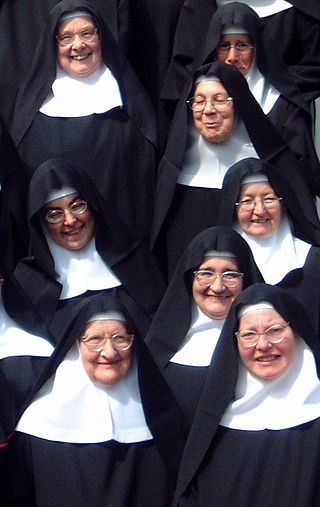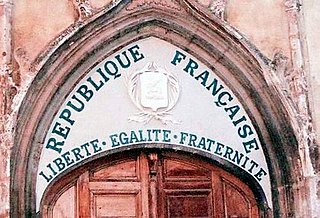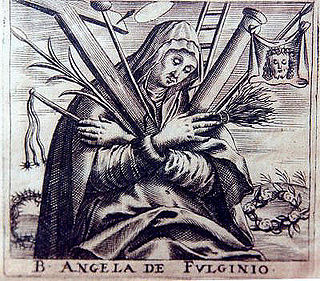Secularism is the principle of seeking to conduct human affairs based on naturalistic considerations, uninvolved with religion.

A nun is a woman who vows to dedicate her life to religious service and contemplation, typically living under vows of poverty, chastity, and obedience in the enclosure of a monastery or convent. The term is often used interchangeably with religious sisters who do take simple vows but live an active vocation of prayer and charitable work.
The separation of church and state is a philosophical and jurisprudential concept for defining political distance in the relationship between religious organizations and the state. Conceptually, the term refers to the creation of a secular state and to disestablishment, the changing of an existing, formal relationship between the church and the state. The concept originated among early Baptists in America. In 1644, Roger Williams, a puritan minister and founder of the state of Rhode Island and The First Baptist Church in America, was the first public official to call for "a wall or hedge of separation" between "the wilderness of the world" and "the garden of the church." Although the concept is older, the exact phrase "separation of church and state" is derived from "wall of separation between Church & State," a term coined by Thomas Jefferson in his 1802 letter to members of the Danbury Baptist association in the state of Connecticut. The concept was promoted by Enlightenment philosophers such as John Locke.
In secular usage, religious education is the teaching of a particular religion and its varied aspects: its beliefs, doctrines, rituals, customs, rites, and personal roles. In Western and secular culture, religious education implies a type of education which is largely separate from academia, and which (generally) regards religious belief as a fundamental tenet and operating modality, as well as a prerequisite for attendance.

In politics, integralism, integrationism or integrism is an interpretation of Catholic social teaching that argues the principle that the Catholic faith should be the basis of public law and public policy within civil society, wherever the preponderance of Catholics within that society makes this possible. Integralism is anti-pluralist, seeking the Catholic faith to be dominant in civil and religious matters. Integralists uphold the 1864 definition of Pope Pius IX in Quanta cura that the religious neutrality of the civil power cannot be embraced as an ideal situation and the doctrine of Leo XIII in Immortale Dei on the religious obligations of states. In December 1965, the Second Vatican Council approved and Pope Paul VI promulgated the document Dignitatis humanae–the Council's "Declaration on Religious Freedom"–which states that it "leaves untouched traditional Catholic doctrine on the moral duty of men and societies toward the true religion and toward the one Church of Christ". However, they have simultaneously declared "that the human person has a right to religious freedom," a move that some traditionalist Catholics such as Archbishop Marcel Lefebvre, the founder of the Society of St. Pius X, have argued is at odds with previous doctrinal pronouncements.

Laïcité is the constitutional principle of secularism in France. Article 1 of the French Constitution is commonly interpreted as the separation of civil society and religious society. It discourages religious involvement in government affairs, especially in the determination of state policies as well as the recognition of a state religion. It also forbids government involvement in religious affairs, and especially prohibits government influence in the determination of religion, such that it includes a right to the free exercise of religion.

The biretta is a square cap with three or four peaks or horns, sometimes surmounted by a tuft. Traditionally the three-peaked biretta is worn by Christian clergy, especially Roman Catholic clergy, as well as some Lutheran and Anglican clergy. A four-peaked biretta is worn as academic dress by those holding a doctoral degree from a pontifical faculty or pontifical university or faculty. Occasionally the biretta is worn by advocates in law courts, for instance the advocates in the Channel Islands.
Anti-clericalism is opposition to religious authority, typically in social or political matters. Historical anti-clericalism has mainly been opposed to the influence of Catholicism. Anti-clericalism is related to secularism, which seeks to separate the church from public and political life.
Most schools in Macau are private or subsidized schools. As of the 2023–2024 school year, there were 76 schools in Macau, including eight public schools and 68 private schools. Of the 73 schools that offered formal education, six were not a part of Macau's free education network. As of 2006 many of the schools in Macau are operated by Catholic organizations.
Catholic schools are parochial pre-primary, primary and secondary educational institutions administered in association with the Catholic Church. As of 2011, the Catholic Church operates the world's largest religious, non-governmental school system. In 2016, the church supported 43,800 secondary schools and 95,200 primary schools. The schools include religious education alongside secular subjects in their curriculum.

The term third order signifies, in general, lay members of Christian religious orders, who do not necessarily live in a religious community such as a monastery or a nunnery, and yet can claim to wear the religious habit and participate in the good works of a great order. Roman Catholicism, Lutheranism and Anglicanism all recognize third orders.
A religious is, in the terminology of many Western Christian denominations, such as the Catholic Church, Lutheran Churches, and Anglican Communion, what in common language one would call a "monk" or "nun".

Consecrated life is a state of life in the Catholic Church lived by those faithful who are called to follow Jesus Christ in a more exacting way. It includes those in institutes of consecrated life, societies of apostolic life, as well as those living as hermits or consecrated virgins.
An institute of consecrated life is an association of faithful in the Catholic Church canonically erected by competent church authorities to enable men or women who publicly profess the evangelical counsels by religious vows or other sacred bonds "through the charity to which these counsels lead to be joined to the Church and its mystery in a special way". They are defined in the 1983 Code of Canon Law under canons 573–730. The Congregation for Institutes of Consecrated Life and Societies of Apostolic Life has ecclesial oversight of institutes of consecrated life.

Angela of Foligno was an Italian Franciscan tertiary who became known as a mystic from her extensive writings about her mystical revelations. Due to the respect those writings engendered in the Catholic Church she became known as Theologorum Magistra, as first used by Maximilian Sandaeus, later cited by Bollandus in the Acta Sanctorum).

Christianity is the largest religion in Uruguay, with Catholics having the most adherents, but around 44.5% of the population is non-religious as of 2021. Church and state are officially separated since 1916.
Religion in Mali is predominantly Islam with an estimated 95 percent of the population being Muslim, with the remaining 5 percent of Malians adhering to traditional African religions such as the Dogon religion, or Christianity. Atheism and agnosticism are believed to be rare among Malians, most of whom practice their religion daily, although some are Deist.
Provida Mater Ecclesia was an apostolic constitution by Pope Pius XII, that recognized secular institutes as a new form of official consecration in the Catholic Church.
Primo Feliciter was a motu proprio issued by Pope Pius XII on March 12, 1948.

The First School War was a political crisis in Belgium over the issue of religion in education. The School War marks the high water mark of the conflict between the conservative Catholic Party, and the secular Liberal Party. The war lasted from 1879 to 1884 and resulted in a period of nearly fifty years of Catholic political dominance. It was followed by a Second School War between 1950 and 1959.










